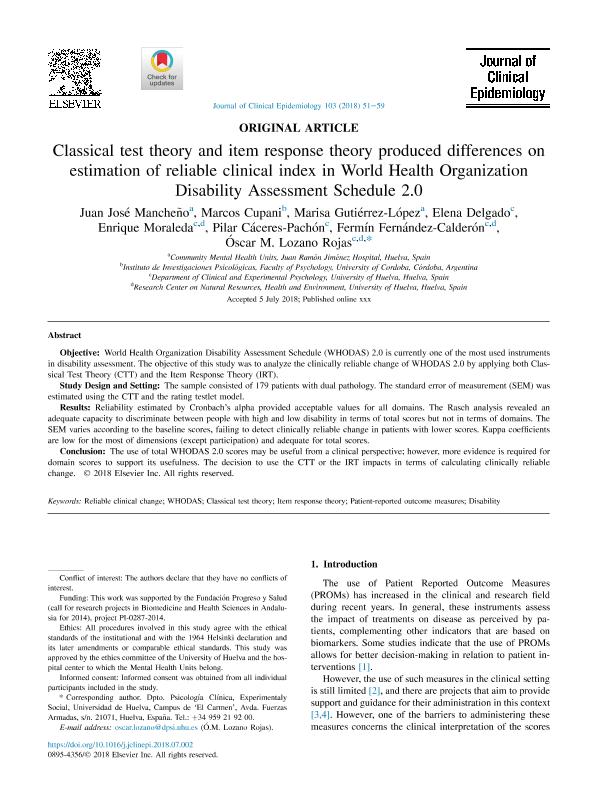Artículo
Classical test theory and item response theory produced differences on estimation of reliable clinical index in World Health Organization Disability Assessment Schedule 2.0
Mancheño, Juan José; Cupani, Marcos ; Gutiérrez-López, Marisa; Delgado, Elena; Moraleda, Enrique; Cáceres-Pachón, Pilar; Fernández Calderón, Fermín; Lozano Rojas, Óscar M.
; Gutiérrez-López, Marisa; Delgado, Elena; Moraleda, Enrique; Cáceres-Pachón, Pilar; Fernández Calderón, Fermín; Lozano Rojas, Óscar M.
 ; Gutiérrez-López, Marisa; Delgado, Elena; Moraleda, Enrique; Cáceres-Pachón, Pilar; Fernández Calderón, Fermín; Lozano Rojas, Óscar M.
; Gutiérrez-López, Marisa; Delgado, Elena; Moraleda, Enrique; Cáceres-Pachón, Pilar; Fernández Calderón, Fermín; Lozano Rojas, Óscar M.
Fecha de publicación:
11/2018
Editorial:
Pergamon-Elsevier Science Ltd
Revista:
Journal of Clinical Epidemiology
ISSN:
0895-4356
Idioma:
Inglés
Tipo de recurso:
Artículo publicado
Clasificación temática:
Resumen
World Health Organization Disability Assessment Schedule (WHODAS) 2.0 is currently one of the most used instruments in disability assessment. The objective of this study was to analyze the clinically reliable change of WHODAS 2.0 by applying both Classical Test Theory (CTT) and the Item Response Theory (IRT).Study Design and SettingThe sample consisted of 179 patients with dual pathology. The standard error of measurement (SEM) was estimated using the CTT and the rating testlet model.ResultsReliability estimated by Cronbach´s alpha provided acceptable values for all domains. The Rasch analysis revealed an adequate capacity to discriminate between people with high and low disability in terms of total scores but not in terms of domains. The SEM varies according to the baseline scores, failing to detect clinically reliable change in patients with lower scores. Kappa coefficients are low for the most of dimensions (except participation) and adequate for total scores.ConclusionThe use of total WHODAS 2.0 scores may be useful from a clinical perspective; however, more evidence is required for domain scores to support its usefulness. The decision to use the CTT or the IRT impacts in terms of calculating clinically reliable change.
Archivos asociados
Licencia
Identificadores
Colecciones
Articulos (IIPSI)
Articulos de INSTITUTO DE INVESTIGACIONES PSICOLOGICAS
Articulos de INSTITUTO DE INVESTIGACIONES PSICOLOGICAS
Citación
Mancheño, Juan José; Cupani, Marcos; Gutiérrez-López, Marisa; Delgado, Elena; Moraleda, Enrique; et al.; Classical test theory and item response theory produced differences on estimation of reliable clinical index in World Health Organization Disability Assessment Schedule 2.0; Pergamon-Elsevier Science Ltd; Journal of Clinical Epidemiology; 103; 11-2018; 51-59
Compartir
Altmétricas



